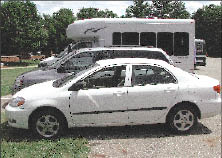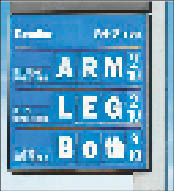Skyrocketing fuel costs are affecting every facet of the youth-serving industry: Agencies are changing their vehicles, cutting programs and services, pooling resources with other agencies and changing day-to-day operations.
| Join us at YouthWorkTALK – a new Web forum to exchange stories and ideas – where Youth Today’s John Kelly hosts a discussion about how you and your colleagues are dealing with rising gas prices. |
We phoned and e-mailed youth work professionals around the country to see how the fuel crisis is affecting them. Below is a sample of what we heard; more details from these and other responses are at YouthWorkTALK.
Cutbacks
Keeping social workers and youth counselors on the road has forced a number of agencies to stop some programs. In Shaker Heights, Ohio, multi-service agency Bellefaire is “in the process of closing our in-home education program for families with autistic children,” says CEO Adam Jacobs. In Ladysmith, Wis., a mentoring program that Youth Today profiled in May for its innovative transportation service has fallen on hard times.
 |
|
Think small: Starr Commonwealth ditched some of its leased vans (in back) in favor of Toyota Corollas (foreground). Photo: Starr Commonwealth |
“[We] will have to cut some activity meetings in half, particularly mentorship activities, reducing the number of meetings from four to two per year, as well as Teen Talk, a youth group for teens in grades six through 12,” says Elva Smith, director of the Kinship program in Ladysmith. The organization is also facing its first staff layoff in 30 years.
Kinship of Greater Minneapolis, which pairs children between 5 and 15 years old with adult mentors, chose to maintain programs but do them during a shorter work week.
“We just scaled back to a four- day work week, with 10-hour days, to reduce the burden of gas prices on our staff,” says Executive Director Dan Johnson. “We have a Web-based database and virtual private network set up so that many of our staff also work out of their homes.”
That strategy is also the choice of Camp Fire USA’s Snohomish County Council in Washington, says Executive Director Dave Surface.
 |
| Photo: Photo courtesy of www.wisegeek.com. |
Virtual Training
Rowantree Education, a Pinehurst, N.C.-based company that produces drug prevention and anti-bullying materials, partnered with an information technology firm to develop a Web-enabled curriculum so that clients would not need to travel for trainings.
“We feel we have to move forward with the most convenient way to serve educators and youth workers,” says CEO Darie Davis. “The days of going away for a week of training are unfortunately a thing of the past.”
Fleet Efficiency
As organizations cut back to accommodate the dent from soaring gas prices, how did Starr Commonwealth – a major provider of residential centers, foster care services and community programs in Michigan and Ohio – meet a transportation budget it set when gas was significantly cheaper?
Just over a year ago, Starr purchased software called FleetCommander from a small California company, Agile Access Control. The software helps the nonprofit track the usage patterns of vehicles (including mileage and number of passengers) at its three sites in Michigan (Albien, Battle Creek and Detroit ) and its two Ohio sites (Columbus and Van Wert). It also enables workers to reserve vehicles efficiently for trips, says Starr spokeswoman Dana Jacobs.
FleetCommander painted a surprising picture for Starr. Its fleet consisted mostly of 15-passenger vans and minivans. “But 90 percent of the time,” Jacobs says of trips taken by staff members, there were three or fewer passengers. “That data made the finance department able to make a recommendation to buy cars.”
Starr dumped open-ended leases on most of its vans (which averaged 20 miles per gallon) in favor of buying smaller group of Toyota Corollas (averaging 35 miles per gallon).
It also re-evaluated the use of employee cars for certain trips. Many staff members didn’t like putting the wear and tear on their cars in the first place. Starr discovered that for trips of 130 miles or longer, it was cheaper to rent cars and use the nonprofit’s tax-exempt fuel advantage than it was to reimburse its employees at the IRS rate of 50.5 cents per mile.
Combined with a push to keep field trips and other youth excursions within a tighter radius, the end result is that Starr budgeted for $218,000 in fuel costs this fiscal year, and Jacobs says it will meet that, barring another astronomical gasoline price increase.
The technology is an investment in the future, but will hit upfront as hard as fuel prices. Agile Access Control President Ed Smith says FleetCommander will run a nonprofit about $1,500 in startup costs, after which an organization can use a Web-based version of the software for $300 a month or purchase it outright for $7,500.
Volunteer Activity Down
“Mentors have had to cut personal contact time with their mentees due to the increase of gas prices,” says John Ervin III, Founder of Modesto, Calif.-based UPLIFT (Utilizing Positive Leaders to Inspire Future Talent). “Single mothers that have the means to transport mentees to our tutoring and group mentoring activities can’t afford to do so regularly, so they miss out on vital group sessions and activities.”
In Westfield, Wis., Susan Allen was executive director of Wisconsin Positive Youth Development Initiative for 20 years. She now serves as a volunteer on a local prevention coalition as a member, officer, and adviser, which often requires traveling to meetings.
“Since the gas prices have been so high, I’ve felt more reluctant to travel and have asked that the meetings rotate to areas closer to my home, or I have offered to host meetings in my home,” Allen says.
Misers Are Wiser
Pete Stollery’s strategy for keeping costs down for the 14-vehicle fleet at the Doylestown, Pa.-based alternative school Choctaw Ridge Academy is beautiful in its simplicity: Drive like the elderly.
“We recently were able to squeeze out two round-trips to Harrisburg and got over 500 miles on one tank,” Stollery says. “Stuff like coast down the hills (most all our vehicles are stick-shift), look ahead and anticipate the traffic light changes, from a standing start accelerate like Grandpa out for a Sunday drive in his ancient Cadillac, etc.”
Guarding Against Theft
The Rocky Mountain Youth Corps in Ranchos de Taos, N.M., has already experienced one problem that could affect other youth organizations, many of which have no choice but to leave a fleet of cars parked in lots overnight.
“With a 30-gallon tank on many of our SUVs and vans, we have begun to experience gas thievery, having fuel siphoned off from our vehicles while parked at our facility overnight,” says Executive Director Carl Colonius. RMYC’s only counter-measure at the moment has been to tightly park the vehicles, side by side and front-to-end, so that the tanks are hard to access.































